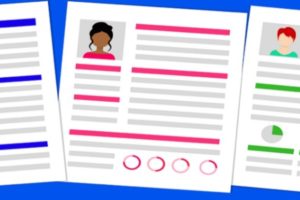In today’s increasingly competitive job market, your CV needs to be designed to help you stand out from the crowd. Companies are receiving thousands of CVs each week from across the world.
Google recently recently revealed that they receive upwards of two-million resumes each year and from my own experience, I’ve had over two thousand applications to a personal assistant role that I recently put on LinkedIn.
What Do Employers Look for In A CV?
The first job of any candidate looking for a new job is to write their CV correctly. This not only means making sure you have all the information that a recruiter or hiring manager wants to see, but also making sure your CV passes the relevancy test and is picked up by a recruiters scanning software.
Recruiters on average spend 6-to-30 seconds reading your CV before either moving on, or picking up the phone and calling you. If you want to make sure that your CV is selected, you need to make sure that it’s written correctly.
In this post we’re looking at what your CV needs to include to impress recruiters and hiring managers.
Professional CV’s
How your CV looks is going to be the first step. Over the years I have been sent some crazy CV’s that might be appreciated if you’re applying for a graphic design role, but generally don’t go down too well in the professional work place. It’s best to stay away from these designs and look for a standard layout.
Make sure you choose the right font (Tahoma size 10/11 for the body and size 14 for Headings), use the same style the whole way though, use bullet points, line breaks and bold formatting to increase the visual impact.
CV Title
The title (top section) section of your CV is where you put your name, telephone number and email. Make sure they’re correct. Nothing will get your CV into the bin quicker than if your telephone number doesn’t work.
Next to your name, place any major qualifications such as MBA, ACCA, and CPA. An employer is going to look at your name and will notice any major qualifications.The first section should also include your Personal Statement. Your Personal Statement is the first opportunity to impress and whilst it’s unlikely that it will be read, it’s very important that you get it right. You should write your personal statement in the third party.
“Dynamic professional with over 10 years’ experience in… Proven Track record…”, is a great starting point for a personal statement. Whilst, like I stated before, it’s highly unlikely your personal statement will be read, it’s a great place to get relevant keywords into your CV that will help you beat any applicant tracking systems that the company is using to sort through the thousands of CVs they receive each week.
Employment History
Employers, Recruiters and Hiring Managers want to know what you can do for their business and not what job you’re looking for, personally. Recruiters are looking for the companies that you’ve worked at before, the positions, and further explanation of what you’ve been personally responsible for. Try to focus your experience on the last 10 years.
Hiring managers are generally more interested in the projects that you’ve been involved in and what you’ve have achieved rather that your day-to-day responsibilities. There’s a good chance that your hiring manager will have already done your job for a few years in the past and knows exactly what is required of you.
The Companies
If you’re working in a major company that everyone has heard of such as PepsiCo or Nike, then you can leave off the company description. If on the other hand you’re working at Nick’s Place which no-one will have heard of because it’s just been made up, then you need to include a short one- or two-line description of the company.
Employers like people from their own industry, therefore, if your experience is in a property company, other property companies will be interested in you.
Job Titles
Your job titles need to be included in your CV and if possible, try to get your job titles increasing in seniority over time. CEO and Head of are great job titles, however, if you’re suddenly applying for junior management roles, questions will be asked.
Your Responsibilities
Employers are looking to find out what you, personally, have had experience of. You need to explain each keyword that you use. If you’re a financial planner, don’t just put the keyword “financial planner”, but explain in further detail what you actually were responsible for.
Whatever you do, don’t lie or bend the truth on your CV as you will be found out and honestly this is not a good way to make a good impression. Recently I met a Sports Event Manager whose CV read “responsible for organizing from scratch a sporting event”. The interview lasted 15 minutes because the candidate was not responsible for anything and was just involved in the organization of a sporting event.
Education
The right place for your education really depends on the level of your qualifications and what else you have to offer. If you have better education than work experience, then your education should come first.
For your major qualifications I would always recommend that you put these next to your name at the top of your CV to stand out, however, for the rest of your education, include the dates, the name of the college and what you studied. If you have great grades, then you can include this otherwise leave it out.
Relevancy
Apply to jobs that you are perfect for, not jobs that you can do in your sleep, or ones that you would like to try because you think you could do it. Employers want candidates that will consider the job to be a challenge and, therefore, enjoy their working day.
Employing a candidate who is going to find the job too easy, too difficult or does not have working experience, means that most likely they’re going to be looking for another candidate in six months as their first choice has declined the post. If the candidate finds the job too easy, they will become bored, not be motivated, and when a better job comes along they will leave. If the candidate finds the job too difficult because they don’t have the experience, the employer will have to spend a lot of time helping the candidate get up to speed so that they can carry out the work on their own.
If the candidate cannot learn quickly the employer will have to find another person to do the work which means they’ve wasted a lot of time – again, not something they want to have to do. Job Relevancy is very important, and employers are wise to this point. Ideally, you need to only apply for jobs that are a slight step up for you. Either the job responsibilities will be 90% of what you are doing already and 10% something new, or the same job but in a slightly larger business. Applying for jobs that are five pay grades above yours will only get your resume quicker into the bin.
Tailor Made
Employers want to see skills on a candidate’s CV, but with the thousands of resumes flying around all over the Internet, skill keywords are becoming less and less important. Every CV that I read will feature the words team player, motivated candidate, good communication skills or good organization skills. Honestly, such words are simply meaningless these days.
Employers still want to see these keywords, but they also want to see keywords that are relevant to them. Companies will often use some form of applicant tracking system where keywords are searched for on your resume. Any resumes without these specific keywords will instantly be rejected.
Applicant Tracking Systems
You need to make sure that your CV includes keywords from the company’s career website that will be specific to them. If we look at Google’s Career Site, the first thing you will notice is their motto: “Do Cool Things that Matter”. If you’re going to apply to Google, make sure this phrase is on your resume.
Further down on the main career page, Google mentions that they “don’t just accept difference – we celebrate it, support it and thrive on it”. If you want to apply to Google then a perfect personal statement that includes these words, something like: “Dynamic, skilled and highly educated candidate that doesn’t just accept difference but celebrates it, supports it and thrives on it” could be a great way to start the resume that you’re going to send to Google to get it to stand out from the crowd.
Follow Up
Your CV is the first step into a new job and once you’ve passed the test and have an interview, you’re 75% of the way to getting a new job. Employers don’t have time to interview hundreds of candidates until they meet the right one, therefore if you get an interview, the job is yours unless you lose it during the interview process.
Nick Jones
Latest posts by Nick Jones (see all)
- What Job Should I Do? It Depends on Whether You’re An Introvert Or An Extrovert - November 17, 2021
- Ten Ways to Unplug and Recharge During The Holiday Season - November 3, 2021
- 10 Jobs for Teenagers to Earn Extra Money - October 13, 2021








